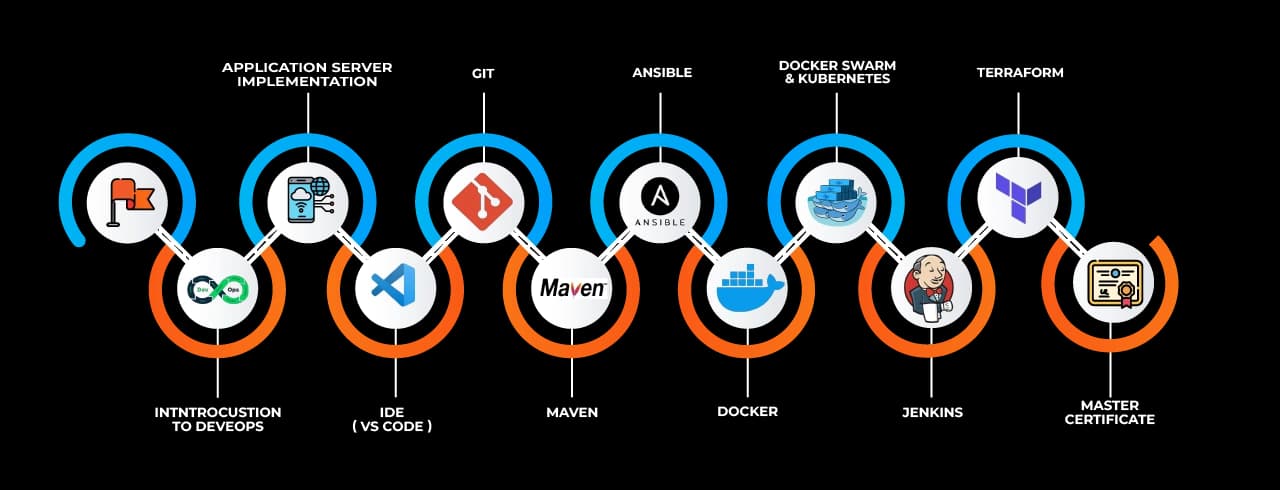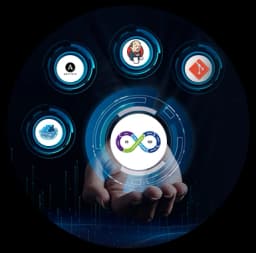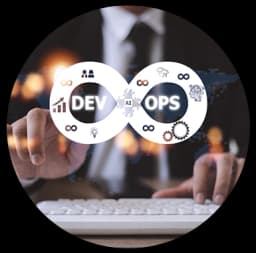About DevOps
DevOps makes development and operational processes faster and more resource-efficient. Companies can save money while producing higher-quality software products for consumption or internal use. The DevOps course in Delhi explains the main concepts of DevOps. How did it come about? best practices, topologies, and the most common benefits of a DevOps environment, much more.
What is DevOps?
Traditionally in the IT industry, employees were part of the development team. A separate team called IT Operations, or, Ops worked to support IT. The development and operations team had separate leadership, responsibilities, and goals. In many companies, teams worked at different levels and rarely communicated. This culture of "silos" resulted in poor communication and collaboration between these teams. A rigid barrier between them that they could only overcome necessarily. The DevOps shift has successfully broken this silo mentality - by bridging the gap between Dev and Ops teams with:
Collaboration and Sharing responsibilities
Take full responsibility for the software you deliver throughout its software lifecycle. Today, the IT industry has accepted DevOps widely. It includes leading technology companies such as Amazon, Facebook, Google, Netflix, and BMC Software. Ability to spread DevOps principles across the company beyond IT.
How DevOps has Developed
Before 2000, most IT industries adopted the classic cascade model, a linear approach to software development. QA engineers and operations teams working in silos spent more time testing the code. A gap, sometimes years, between software versions, with frequent bug fixes and software patches being implemented between versions. With the establishment of the Agile software approach, the IT industry has switched to developing software iteratively and regularly. Continuous Integration (CI) and Continuous Delivery (CD) are techniques used in this model for rapid software delivery. As a result, DevOps encouraged seamless collaboration between development and operations teams at every stage of the cycle, they say DevOps is rooted in the Agile method.
DevOps Training in Delhi
This Delhi DevOps Training in Delhi is the ideal platform. That enables you to develop skills in major DevOps tools like Git, Jenkins, Nagios Ansible, Docker, GitHub, Maven, Kubernetes. The DevOps Course in Delhi also enables you to develop applied skills. It also contains conceptual knowledge in DevOps concepts. It is such as Continuous Development, Continuous Testing, Continuous Integration, Configuration Management, Continuous Software Monitoring, and other critical topics. By working on several projects and tasks, the students gain experience in the automation of the Software Development Lifecycle (SDLC). It is with tools such as Chef / Puppet and the implementation of web applications with Docker containers. Sign up now for the best DevOps Classes in Delhi, working with domain experts with over 10 years of industry experience. Request a demo session and get a full view of the DevOps industry landscape.
DevOps course Delhi also gives the opportunity to interact with DevOps industry experts. Become a guaranteed DevOps proficient by effectively finishing this DevOps Course. You can go after lucrative DevOps positions. The context of DevOps has been specially developed, by industry experts. It turns the students into seasoned DevOps professionals who are valuable and ready for the industry. In the DevOps Course in Delhi, participants can develop skills to work with AWS Linux server configuration commands and techniques. Gain experience with DevOps tools, Automated testing, and monitoring processes, and much more. Knowledge of the continuous development, integration, and testing processes of DevOps. Gain experience managing creation, monitoring, and test automation tools. Learn how to create containers with Docker; Develop skills in using continuous monitoring tools, such as Nagios. Learn how to use source control tools in DevOps course Delhi with job guarantee. Develop a hands-on presentation that works on many projects and assignments.
Key Benefits of DevOps
Organizations adopting the DevOps culture see improvements in many aspects of their software delivery process includes -
Improving communication and collaboration between teams. Improving organization efficiency and productivity.
Increasing the speed of software releases.
Maximizing customer satisfaction (your customers now get quality software).
Ensure system availability and reliability by detecting threats and incidents faster and earlier.
Promote innovation by sharing different ideas between teams.
DevOps goes beyond a business model. Due to its abstract nature, DevOps is difficult to define in just a few sentences. DevOps isn't only a plan of action, yet a culture. Change to integrate and automate Software Development and Operational processes in a unified workflow with a focus on the rapid release of high-quality software that meets customer requirements. DevOps achieves excellence by integrating defined best practices into every step of the Software Development Lifecycle. Organizations need to identify the team topology that best suits them in DevOps to strive for the long term. When properly implemented, the DevOps culture can bring tremendous benefits to organizations in terms of successful software releases.
Why is SevenMentor the best DevOps training in Delhi?
With many years of experience in offering DevOps training, SevenMentor is the best DevOps Training Institute in Delhi. The trainer imparts a great deal of knowledge in 9 units of 4 hours each. It takes place on the weekends and weekdays. We provide Virtual live training. Get past classroom training with detailed examples, demos, and hands-on sessions, as well as lifetime access to training videos. The DevOps Course in Delhi fees are generally pocket-friendly. The use of the individual DevOps tools is explained with a practical demonstration. More than 20 live demonstrations are part of the DevOps Classes in Delhi. A project is assigned at the end, and only after an expert examination will you receive a DevOps certification with job placement. It corresponds to 6 months of professional experience in the project. You will also receive a certificate of experience in the project.
Online Classes
You can also get help setting up your system and connecting it for Online DevOps Training in Delhi. All you need is a PC with a Mac, Linux, or Windows operating system. At least 4 GB of RAM and 20 GB of hard disk space are required, to attend DevOps training Delhi and work on a project.
It offers comprehensive Online DevOps Classes in Delhi on the following DevOps topics
- Principles of CI / CD concepts.
Continuous integration, development, and deployment.
Automation of configuration management.
What is cross-team collaboration?
A detailed explanation of IT service agility.
Using various DevOps tools including Jenkins, Ansible, Docker, Nagios, etc.
There are many DevOps Training institutes in Delhi, but you need to know which is the right one when investing your time and money. They have almost the same curriculum. The most important thing is the trainer, the study material, and the project. These are the 3 most important reasons why, in our opinion, the best Online DevOps Course in Delhi is SevenMentor.
Features-
DevOps Online training is with 100% placement.
Support 1,860 testers in 600 companies in the last 8 years.
Expert trainer provides real-time industry-oriented DevOps training with case studies for companies. SevenMentor arranges free skills courses and sample interviews.
Corporate Training
If you are a company and you need Corporate DevOps Classes. It would like to improve the DevOps skills of your employees, your team, SevenMentor could be the perfect partner. Our Corporate DevOps Training in Delhi helps the development of your resources; it expands your IT technology skills, increasing your business ROI. It keeps Corporate DevOps training costs under control. It mainly focuses on hands-on experience. SevenMentor is a leading provider of Corporate DevOps Course in Delhi, India. We are a highly respected company that has been in the training business for over a decade. In everything we do, we strive for excellence and provide DevOps Training.
Services that are:
Highest quality Tailor-made DevOps training modules tailored to your project/customer needs.
Flexible and very cost-effective.
DevOps course Delhi is taught by CERTIFIED instructors and consultants.
Each trainer is with more than 10 years of experience.
The DevOps courses are taught by professional and highly qualified trainers; with many years of experience in their respective industries.
Real-time practical training, in a convenient place for you.
We promise unique and advanced techniques with combinations of courses according to your requirements.
We also assure you of perfect knowledge at all times.
 Bridge the Gap Between Development & Operations with Hands-On Training
Bridge the Gap Between Development & Operations with Hands-On Training Learn To Master DevOps Tools and Automation for Seamless IT Operations
Learn To Master DevOps Tools and Automation for Seamless IT Operations Unlock High-Paying DevOps Roles with Industry-Focused Course at SevenMentor
Unlock High-Paying DevOps Roles with Industry-Focused Course at SevenMentor







